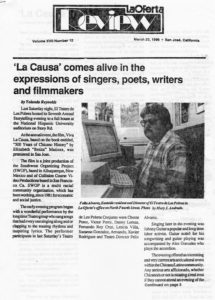March 20, 1996
by Yolanda Reynolds

Last Saturday night, El Teatro de Los Pobres hosted its Seventh Annual Storytelling evening to a full house at the National Hispanic University
auditorium on Story Rd.
At the annual event, the film, Viva Ia Causa, based on the book entitled, “500 Years of Chicano History” by Elizabeth “Betita” Martinez, was premiered in San Jose.
The film is a joint production of the Southwest Organizing Project (SWOP), based in Albuquerque, New Mexico and of Collision Course Video Production based in San Francisco Ca. SWOP in a multi-racial community organization, which has been working, since 1981 for economic and social justice.
The early evening program began with a wonderful performance by the longtime Teatro group who sang songs that had every one singing along and or clapping to the rousing rhythms and inspiring lyrics. The performer participants in las Saturday’s Teatro de los Pobres were Chente Pérez, Danny Lomas, Fernando Rey Cruz, Leticia Villa, Suzanne Gonzalez, Armando, Xavier Rodríguez and Teatro Director Félix Alvarez.
Singing later in the evening was Johnny Guitar a popular and long-time labor activist. Guitar noted for his songwriting and guitar playing was accompanied by Alex Gonzales who plays the accordion.
The evening offered an interesting and very current arts and cultural event within the Chicano/Latino community. Any serious arts aficionado, whether Chicano/a or not is missing a real treat if they cannot attend an evening of the Teatro’s storytelling.
Nena Segura, a self-proclaimed “hip hop” rap poetess of the thoughts of the younger generation, shared those sentiments with the multi aged audience. Though her thoughts came from the younger generation, of which there were many in the audience, it had resonance as well with the older generation.
Segura recited two rap poems, “Browning of America” and “Chicana Nation.” In “Browning of America” a memorable line was. “(we will) no assimilate – that’s to imitate” as she went on to describe the cultural traditions that are valuable to Raza and that should not and will not be discarded.
Robert Duran, a published poet, read a number of his recent poems that will be included in the next publication of his work. He is a master at creating, with very few words, strong images and feelings. Some of his poems consisted of only one sentence. Poetry in the Latino/Chicano community has always been a major art form, with long folk and formal tradition.
An example of a short poem was “Don’t look in the mirror too long – you might see yourself.” Duran’s poems included themes regarding everyday life, prejudice, bigotry, history, personal relationships and police brutality, among other topics.
At the event, major donors, “angels” to the Teatro were recognized. Among them were Ernestina Garcia, a long-time community advocate and Kathy Chavez Napoli a local businesswoman and community advocate. The Teatro lakes great pride in accepting donations only from the community. Lt does not solicit funds from government agencies as a way to maintain its independence.
The highlight of the evening was the well-researched account highlighting the Chicano history of the Southwest.
Contrary to many historical accounts of the Southwest, credit was given to the contributions of the indigenous communities. There is also a proud acknowledgement of the indigenous heritage of the Chicano community.
The film, in two parts, which was designed for use in the school room and for the students, teachers and others, offers an almost unlimited resource, issues and information for discussion or further research.
Still, today, the Chicano community and working people are facing problems and issues that our parents and ancestors before us faced.
Just last week over 500 Latina educators gathered for a three-day conference to discuss issues regarding education in California.
Elizabeth Martinez says, this book and film lets us know more about ourselves. “This is a story that is not usually told,” she says. Martinez adds, “we must feel respect for ourselves and thereby gain the respect of others.”
This history includes the stories of many Chicano leaders, both of our past and of today, whose work has resulted in changes in such disparate places of the United States as the East Coast, Midwest, Southwest, Florida, and most definitely California.
As the film unfolds, it is evident that the Chicano brought enormous economic benefit to all segments of this country.
Some of the stories that were recounted in the book, and now in the film, are still playing out in our communities. Just Saturday morning, almost 300 persons marched from Third and St. John Streets in memory of and protest for the death of Gustavo Soto Mesa by a gunshot at the hands of a Santa Clara Deputy Sheriff, Tom Langley.
Father Mateo Sheedy, pastor of the nearby Sacred Heart Church, led the protest group in prayer. He offered comments to those who gathered for a short ceremony at the end of the morning march which took place at, the site where Soto felt dead on State street.
The group promised that they would continue to march in search of justice, every Saturday morning.
The next protest match will be next Saturday, beginning at the same time and at the same location.
On Saturday, March 31, the UFW and the Teatro de Los Pobres have planned a march in memory of Cesar Chavez. The march will begin at 12:30 p.m. at the Cesar Chavez Elementary School located at 2000 Kammerer Ave. At 3p.m. there will be a celebration program at Plaza de Cesar. E. Chavez in downtown San Jose. At 5:30 p.m. there will be a Mariachi Mass at St. Joseph’s Cathedral. March 31 is Chavez’ birthdate.
For more information on the video, “Viva la Causa”, call (505)247-8832 or write SWOP at 211 10th Street SW, Albuquerque, N.M.
For more information, telephone either the United Farm Workers at (408) 266-3875 or El Teatro de los Pobres at (408) 254-3878. © La Oferta Newspaper.
